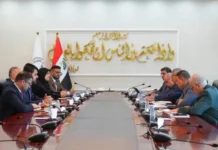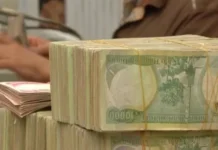
The Federal Supreme Court (the highest judicial authority in Iraq) announced, on Monday, the resolution of appeals to the election law.
The media of the Federal Supreme Court said, in a statement received by Shafaq News Agency, that the Federal Supreme Court considered in a public session this day, corresponding to 28/8/2023, the appeals filed before it with the number (73 and its units 79, 89, 103, 104, 114, 118, 144 and 145 Federal / 2023) to appeal The constitutionality of several articles of Law No. 4 of 2023 (Law No. 12 of 2018 on the Third Amendment to the House of Representatives, Provincial and District Council Elections Law) and issued its final and binding decision to all authorities, including the following:
First: The unconstitutionality of Paragraph (b) of Clause (First) of Article (5) of Law No. (4) of 2023, which stipulates that (after the end of the electoral cycle for the provincial councils stipulated in Clause (First) of this article, elections will be held before ( 45) forty-five days, and the election date is determined by a decision of the Council of Representatives in coordination with the Commission before a period of no less than (90) ninety days).
Second: The unconstitutionality of Clause (Third) of Article (6) of Law No. (4) of 2023 (Law No. (12) of 2018 on the Third Amendment to the House of Representatives, Provincial Councils and District Elections Law), which stipulates (that he not be convicted of a felony or A misdemeanor involving moral turpitude or cases of administrative and financial corruption stipulated in Articles (330, 333, 334, 335, 336, 338, 339, 340) of the Penal Code No. (111) of 1969, amended by a final judicial ruling, whether or not it was covered by pardon. And the adoption of the text of Clause (Third) of Article (5) of Law No. (14) of 2019 (Law No. (12) of 2018, which stipulates (to be of good conduct) Not convicted of a felony or misdemeanor involving moral turpitude, including cases of administrative and financial corruption, by a final judicial ruling, whether or not it was covered by a pardon.
Third: The unconstitutionality of Paragraph (C) of Clause (First) of Article (9) of Law No. (4) of 2023, which stipulates (seats allocated to the Christian component of Parliament membership). Their districts are divided as follows:
1- The two seats of Erbil and Dohuk shall have the Kurdistan region, with its administrative borders, as one constituency.
2- The seats of Baghdad, Nineveh, and Kirkuk, where Iraq (except for the Kurdistan region) will be one constituency.
Fourth: The unconstitutionality of the phrase (Sabi Mandaean) of Paragraph (D) of Clause (First) of Article (9) of Law No. (4) of 2023. The phrase of Paragraph (D) remains as follows: (The seat allocated to the constituent, Iraq will be one constituency The candidacy is individual within the constituency, and the winner is the one with the highest votes.
Fifth: The unconstitutionality of Paragraph (e) of Clause (First) of Article (9) of Law No. (4) of 2023, which stipulates (seats allocated to the components (Yazidis, Shabak, Faili Kurds), the governorate for which the quota seat is allocated is an electoral district One for the House of Representatives elections, and the candidacy is individual within the constituency, and the winner is the one with the highest votes.
Sixth: Confronting and ruling the unconstitutionality of Article (14) of Law No. (4) of 2023, which states (the text of Clause (Second) of Article (37) of the law shall be deleted and replaced by the following: Second: Entities and individuals that prevent political parties from opening their headquarters And the exercise of its electoral activities), and the adoption of the text of Clause (Second) of Article (37) of Law No. (12) for the year 2018 as amended, which stipulates (giving, offering, or promising to give a voter a benefit for himself or for others to make him vote in a certain way or abstain from voting). vote).
Seventh: The unconstitutionality of Article (21) of Law No. (4) of 2023, which states that (the Federal Service Council shall appoint those covered by the provisions of Article (1) of Law No. (27) of 2019 from among the members of (provincial, district and sub-district councils) who continue to serve until 26/11/2019 and their distribution to ministries and entities not associated with a ministry according to specialization and geographical location, and their previous service is counted for the purposes of bonus, promotion and retirement.
Second: The governorates that are not affiliated with a region must provide the Federal Service Council with support for continuity of service and a certificate of the last salary until 11/26/2019 for those covered by the provisions of item (first) of this article).
Eighth: Rejecting the claim of the plaintiffs regarding the appeal against the rest of the articles of Law No. 4 of 2023 that were not ruled unconstitutional referred to above.
In the context, Representative Muhammad al-Khafaji described the ruling as a “judicial victory,” explaining that he “won the lawsuit against the election law, the unconstitutionality of most of the articles that I challenged, and the wonderful efforts of the hero lawyer, Dr. Odeh, including those related to the conditions of the candidate that did not require good conduct and behavior, and the article on seats.” assigned to the components.
He pointed out, “There are ruling articles that may require re-legislation, just waiting for the full decision to be issued.”




